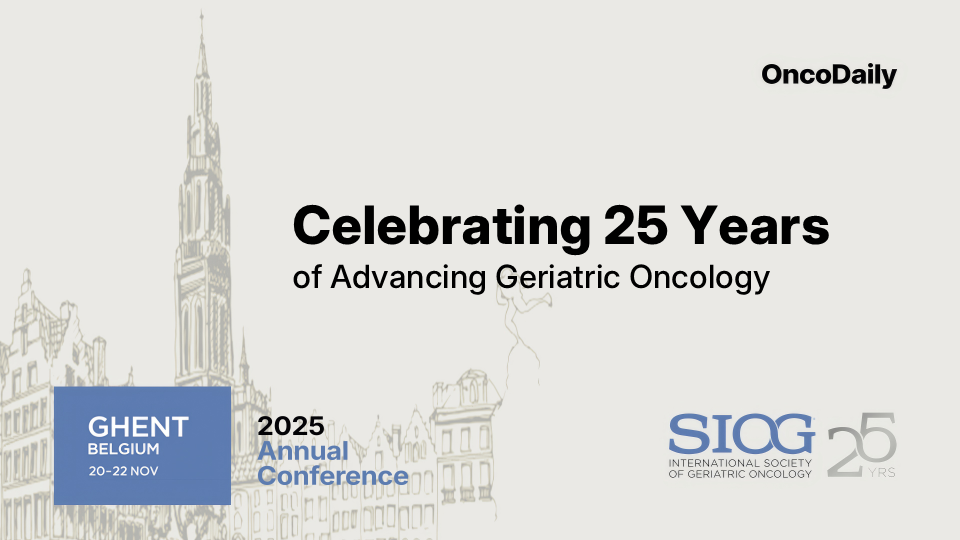Fresh from the SIOG 2025 Annual Congress, the community gathered for a deeply meaningful Celebration Session marking 25 years of the International Society of Geriatric Oncology (SIOG). The session brought together founding members, past presidents, and current leadership to reflect on the society’s origins, its evolution, and the path forward for the global field of geriatric oncology. With contributions from Hans Wildiers, Stuart Lichtman, Martine Extermann, and Grant Williams, the session traced a story of scientific vision, mentorship, friendship, and a shared determination to improve cancer care for older adults worldwide.
A Journey That Began in 2000
The session opened with a reflection on the early days of SIOG. Attendees were taken back to the year 2000 in New York, where the very first meeting was held. What began as a small gathering of like-minded physicians has since become a thriving global society, moving annually from city to city—Lyon, Boston, Rome, San Francisco, Geneva, Montreal, Berlin, Valencia, Milan, Warsaw, Lisbon, Copenhagen, Manchester, and many more.
Despite the rotating cities and shifting venues, one constant has defined SIOG since the beginning: a tight-knit, international community of clinicians, researchers, and advocates united by a mission to improve cancer care for older adults.
The Beginnings of Geriatric Oncology: A Tribute to the Early Pioneers
The historical journey continued with a personal reflection on how the field first took shape. Key pioneers—clinicians and scientists who championed the idea that older adults require distinct oncologic and geriatric approaches—were acknowledged for laying the foundation for the discipline.
Among them was Dr. Rosemary Yancik, widely regarded as one of the central visionary forces behind early geriatric oncology research. Her advocacy and collaboration with the National Institute on Aging helped elevate aging-specific questions in oncology long before the field gained formal recognition. Her influential writings in the 1980s and 1990s shaped how future generations began to think about aging physiology, cancer biology, and treatment tolerance.
The session also revisited a pivotal moment from 1989, when two landmark breast cancer trials published in The New England Journal of Medicine explicitly excluded women aged 65 and older. At the time, this exclusion highlighted a stark but common reality: older adults were routinely left out of clinical research. A published letter protesting this exclusion became a catalyst for raising awareness—and ultimately contributed to the movement that shaped modern geriatric oncology.
By the mid-1990s, collaborative groups such as CALGB (now the Alliance) began forming older adult committees and conducting pharmacology and toxicity studies that recognized aging biology as a defining factor in cancer treatment. These initiatives were driven by early leaders who believed that older patients deserved evidence-informed, individualized care.
SIOG Takes Shape: Building Structure, Credibility, and Global Reach
Martine Extermann offered a structured overview of SIOG’s organizational growth. The society’s earliest programs—task forces, scientific guidelines, national representatives, and collaborative sessions with ASCO, ESMO, and AGS—became the backbone of SIOG’s expanding influence.
The development of task forces was a transformative step. In a world where almost no guidelines existed for managing cancer in older adults, these groups produced some of the first formal documents addressing assessment, treatment adaptation, and clinical trial inclusion.
SIOG’s visibility grew rapidly. A milestone moment came when the city of Geneva illuminated its iconic Jet d’Eau fountain in SIOG’s colors to mark the society’s 20th anniversary—symbolizing its recognition as a respected, impactful global organization.
Another important achievement was the launch of the SIOG Treviso Advanced Course in Geriatric Oncology, which began in 2014. Now a flagship educational program, the course has trained hundreds of clinicians worldwide, fostering a new generation of specialists who carry forward the principles of multidisciplinary, individualized care.
A Field Built on Mentorship and Community
A strong theme running throughout the session was the central importance of mentorship, inclusivity, and collaboration. Early leaders reflected on how personal encouragement, shared opportunities, and cross-continental support allowed the field to flourish. Many recounted formative experiences: unsolicited letters that opened doors, small early meetings where lifelong colleagues were made, and mentorship received during periods of professional uncertainty or personal hardship.
One emotional moment revisited the loss of a beloved colleague in 2018, a tragedy deeply felt across the SIOG community. The reflection reinforced the society’s identity not only as a scientific entity but also as a supportive, human network bound by purpose and friendship.
Looking Ahead: A Global Call to Close the Gap
Grant Williams, the current SIOG President, concluded the session by shifting from history to urgency. Despite major scientific advancements and multiple randomized trials demonstrating the benefits of geriatric assessment–informed care, the global adoption of these practices remains limited.
A persistent gap separates usual oncology care from optimal geriatric oncology care:
- Many older adults worldwide still do not receive comprehensive geriatric assessments.
- Personalized care plans based on functional status, comorbidities, cognition, nutrition, and social support remain far from routine.
- A multidisciplinary approach—integrating nurses, nutritionists, physiotherapists, geriatricians, pharmacists, and oncologists—is still not implemented in most settings.
The next era of SIOG, therefore, is not only about research but about system-level change. Achieving equitable, personalized cancer care for older adults will require collaboration with global health organizations, regulatory bodies, national cancer plans, and local healthcare systems.
A Celebration and a Call to Action
The session ended with gratitude and celebration as attendees were invited to the official welcome reception. But beneath the festivities was a clear message:the next 25 years of geriatric oncology will be defined not only by scientific progress but by implementation, equity, and a collective commitment to ensuring every older adult receives the care they deserve.
From its small beginnings in New York to its present status as the global voice of geriatric oncology, SIOG continues to grow as both a scientific leader and a community dedicated to shaping a more personalized, compassionate, and evidence-based future for older adults with cancer.
For more information click here.


